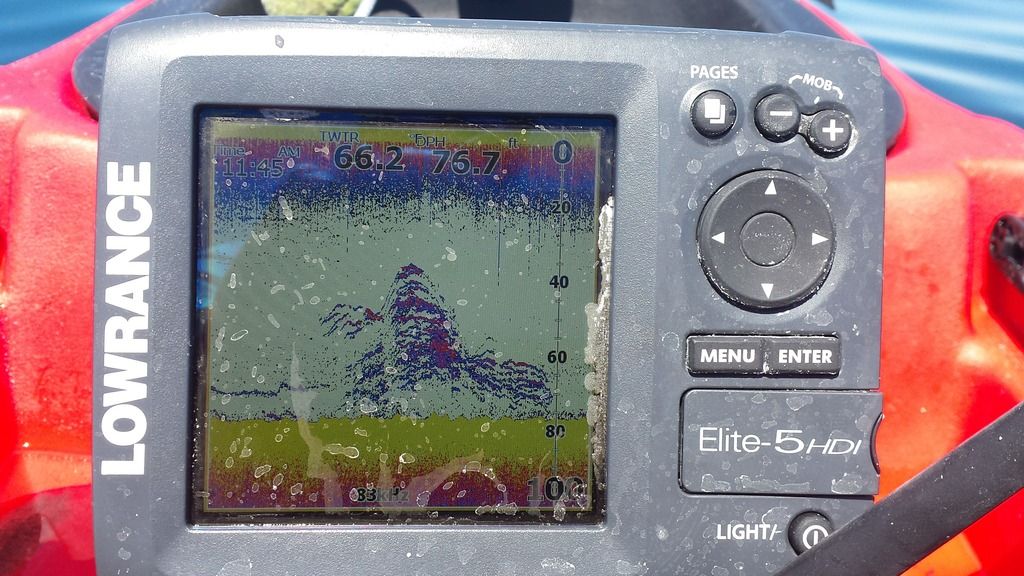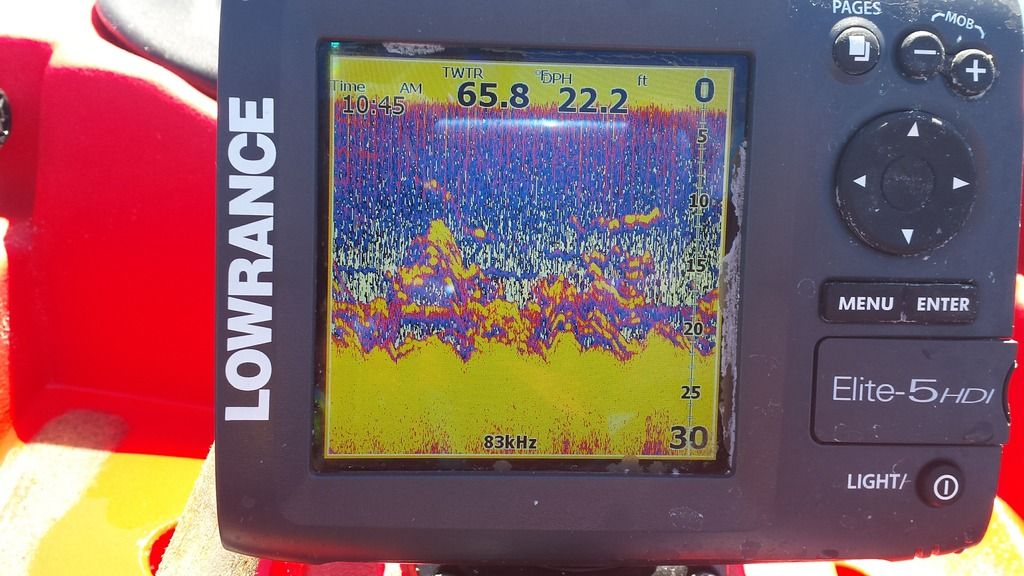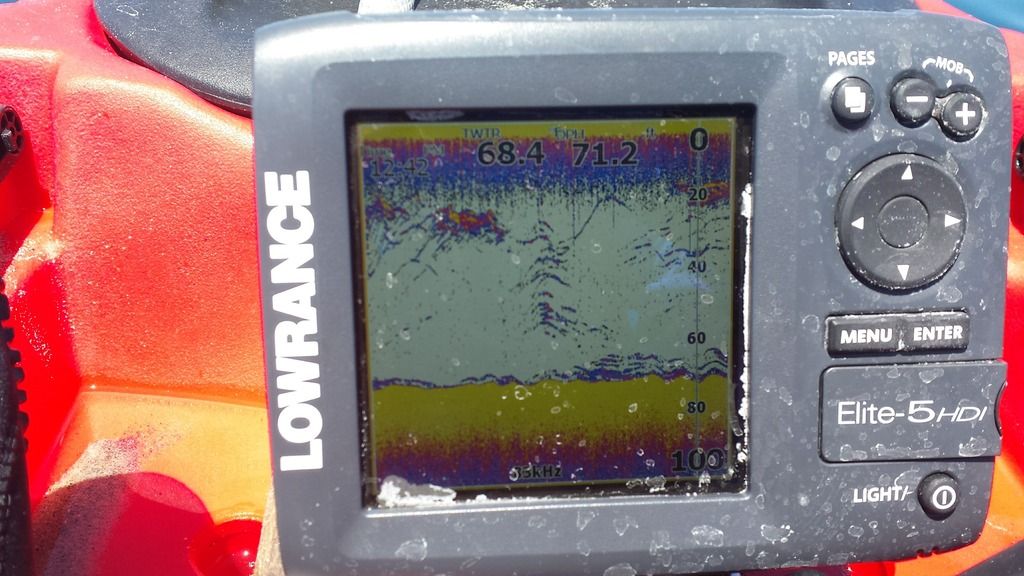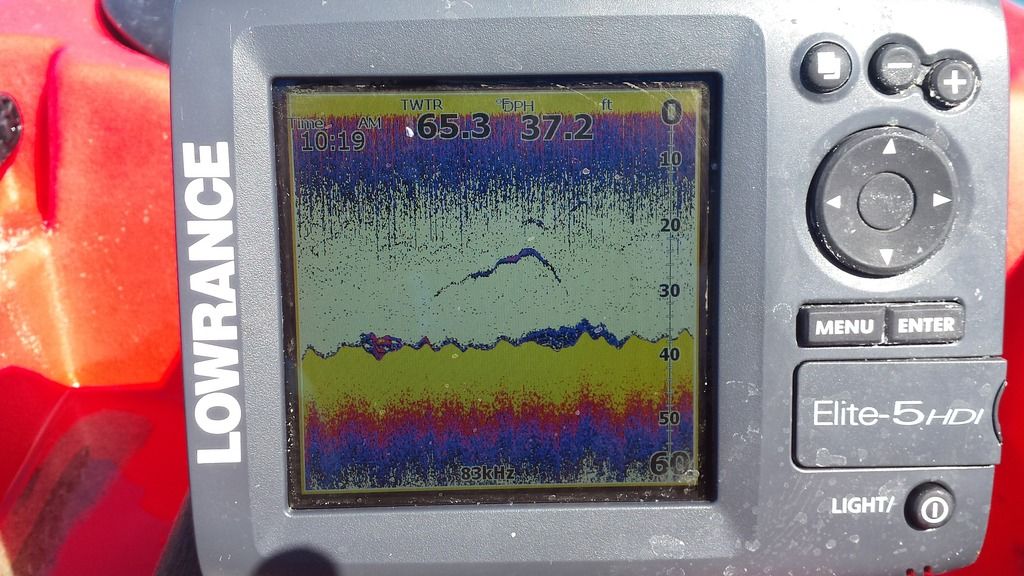
 |
|
|||||||
| Home | Forum | Online Store | Information | LJ Webcam | Gallery | Register | FAQ | Community | Calendar | Today's Posts | Search |
 |
|
|
Thread Tools | Display Modes |
|
|
|
|
#1 |
|
donkey roper
Join Date: Apr 2009
Location: Pacific Beach
Posts: 968
|
Kayak Sonar Discussion
Hey Gang,
I feel like a lot of people have the same kinds of questions when it comes to sonar... Especially from those folks who have just recently got their first fish finder, or have upgraded or switched brands. In internet forums, you typically want to avoid having a bunch of different threads about the same topic. It makes it hard for people to go back and search for the info they need. Some of you who have followed me for a while know that I like to offer sonar tips to fellow kayakers when I can. So I thought I would start my own sonar thread, and try to make it more of a centralized location for some of this info. The format I envision is that people can ask some of their sonar questions here. I'll do my best to check in often, and answer the best I can. Other more experienced members should chime in and address whatever they want, or tear my theories to shreds if you want... I can take it don't worry (; What the thread is NOT for: Put-downs or trolling others, arguing with others about which brand or product is better than another, online deals or people trying to sell their stuff. I use Lowrance, but I will not try to sell their stuff or try to convince you that it is better than another product. This should be the place for technical discussion and sonar theory. I'll kick it off with a few sonar tips for beginners, and a few screen shots from my IG archives  1. Try to mount the transducer in the water. Yes, shooting through the hull works, especially if installed by experts like the guys at OEX. I've done it both ways with the same FF and trust me you are losing sensitivity and signal strength. I would go with a RAM boom arm over a through-hull install every time. 2. Use separate power supply for FF and bait tank. This is for obvious reasons, if one system goes down you don't lose the other device. An entry level sonar like an Elite 4x for example uses very little amperage without GPS. The pump will drain batteries fast, especially 12V. Learn how much juice you need for your setup, and size your batteries appropriately. 3. Stuff will corrode, and need to be repaired. Next time you're at OEX or west marine, buy a bunch of extra terminal connectors, heat shrink butt connectors, and wire. Have all that stuff with you at the launch so when your sonar doesn't turn on, you can repair it right then. Make your wiring easily accessible and give yourself extra slack in case you have to cut and reconnect. Now the "plotter porn"  Kamakazi Yellowtail!  Fatty Homeguard Dives on my Dropper.  Slug Halibut Stacked Like Pancakes!  Looks like WSB to me... what do you think?  School of YT breezing through mid column, out on the periphery of the cone. 
|
|
|

|
|
|
#2 |
|
Senior Member
Join Date: Sep 2015
Location: The I. E.
Posts: 353
|
Great info. Thanks. I'm still a noob when it comes to reading an FF.
|
|
|

|
|
|
#3 |
|
donkey roper
Join Date: Apr 2009
Location: Pacific Beach
Posts: 968
|
|
|
|

|
|
|
#4 |
|
Senior Member
Join Date: Jun 2014
Location: East County San Diego
Posts: 657
|
Can someone say sticky...
Chris,
First off, thanks. This type of input and support has made this forum a wealth of knowledge for many. I can't speak for others, but I have no problem saying that using a fish finder has been one of the more challenging aspects in my fishing, as I spent my entire life fishing without one, until the last couple years. I know many may like to know more info about this question: "So I've gotten a ff and hooked it up, now how do I optimize the settings for fishing Inshore Saltwater?" Cheers, Todd |
|
|

|
|
|
#5 | |
|
donkey roper
Join Date: Apr 2009
Location: Pacific Beach
Posts: 968
|
Quote:
~60' deep or more: you want to be using your lowest frequency mainly. if you have a big enough screen, you can run dual frequency on one screen. But still the lower kHz the better. If you are just getting started, use only your low frequency. lower kHz has better penetration of depth, and seeing beneath hard marks like macks or crabs. it also typically will have a wider beam, which means you can see out to the side around you more. higher frequencies see better resolution of smaller or softer objects. so if you want to look at individual greenbacks, higher kHz is better. Low frequencies will give you the boomerangs and worms of big fish. turn up your sensitivity or gain until the bottom looks like a very "hot" or "hard" color (ie, the bottom looks like my pics above, in whatever color spectum you have) Oh yea, did I mention that having color is pretty important? EDIT: I should also add that you want to use the highest ping speed possible for fishing the deeper waters of LJ and inshore socal. If you get that far, then take some screen shots and post them here. I will give you some feedback from there. 
Last edited by chris138; 09-13-2017 at 10:30 PM. |
|
|
|

|
|
|
#6 |
|
Member
Join Date: Jun 2017
Posts: 58
|
What is the difference on FF and sonar?
Or why do we need the two of them. |
|
|

|
|
|
#7 |
|
donkey roper
Join Date: Apr 2009
Location: Pacific Beach
Posts: 968
|
|
|
|

|
|
|
#8 |
|
Senior Member
Join Date: Nov 2014
Location: SGV
Posts: 848
|
You never ask me questions! Relying on me to interpret my FF all the time. Sheesh!
__________________
Baitfish catcher extraordinaire |
|
|

|
|
|
#9 |
|
Senior Member
Join Date: Sep 2015
Location: The I. E.
Posts: 353
|
|
|
|

|
|
|
#10 |
|
Senior Member
Join Date: Jul 2014
Location: Lake Balboa, The Valley
Posts: 425
|
Can you see fish in REALLY thick kelp the extends from the bottom to surface?
I normally have to adjust the sensitivity to where it almost shows nothing in thick kelp. Then I am not sure if I see fist or not. Lol
__________________
-Beto |
|
|

|
|
|
#11 | |
|
donkey roper
Join Date: Apr 2009
Location: Pacific Beach
Posts: 968
|
Quote:
If you can get the DS dialed in, then you can overlay it on top of your mid/high chirp... for a more advanced configuration. |
|
|
|

|
|
|
#12 |
|
Member
Join Date: Dec 2014
Posts: 61
|
Tagging along to read. I previously had my transducer installed through hull with goop until I used my brother's yak w/FF (in water). The difference in clarity was AMAZING so I immediately changed mine. I haven't gotten to try it yet but excited to check out the difference.
Sent from my iPhone using Tapatalk |
|
|

|
|
|
#13 |
|
Member
Join Date: Apr 2011
Location: San Diego, CA
Posts: 89
|
Thanks for the opening this sonar thread.
I am still figuring out my HDS gen3. and looking for more hints. What is the model of your FF and what kind of transducer do you have? Is there any other settings that you recommend beside low frequency for 200'/300' of water to find the structure? |
|
|

|
|
|
#14 | |
|
donkey roper
Join Date: Apr 2009
Location: Pacific Beach
Posts: 968
|
Quote:
|
|
|
|

|
|
|
#15 |
|
Senior Member
Join Date: Aug 2012
Posts: 1,823
|
 DORADO. YOU'RE BITTTTTTT  Open for interpretation.... Sent from my iPhone using Tapatalk
__________________
"Beware the lollipop of mediocrity; lick it once and you’ll suck forever." — Brian Wilson |
|
|

|
|
|
#16 |
|
donkey roper
Join Date: Apr 2009
Location: Pacific Beach
Posts: 968
|
Definitely gratuitous sonar shots are welcome
 Just be careful giving out your coordinates! 
|
|
|

|
|
|
#17 |
|
Senior Member
Join Date: Apr 2011
Location: Menifee, CA
Posts: 1,473
|
I have a Lowrance Elite 7 Chirp, an suggestions on settings? Can't seem to get it tuned in.
__________________
So long and thanks for all the fish... |
|
|

|
|
|
#18 |
|
Senior Member
Join Date: Jul 2012
Location: Oceanside, CA
Posts: 419
|
Thanks for the thread. I have a few images I would like to share and get your opinion on what you see. I didn't catch any fish during these meter reads.
[IMG]  [/IMG] [/IMG][IMG]  [/IMG] [/IMG][IMG]  [/IMG] [/IMG][IMG]  [/IMG] [/IMG]Thanks for any input.
__________________
   
|
|
|

|
|
|
#19 | |
|
donkey roper
Join Date: Apr 2009
Location: Pacific Beach
Posts: 968
|
Quote:
#1: settings look really good in this one. To me this looks like a big school of fish... not huge fish but not tiny bait either. I've seen big schools of sandbass and calicos mark like this. Also, over rocky reef areas, you will see ocean whitefish and blacksmith perch look like this. Blacksmith or whitefish would explain why you never got a bite. I've seen big schools of yt look kinda like this, but they would be harder marks with a lot more bright reds and yellows in there. #2: Sensitivity is way too high for that depth, need to dial it back a lot. Tough to tell what is there with all washed out like that, but I think I see your dropperloop or some bait down. And probably some baits and small fish checking it out. #3 setting looks great. here we have a big vertical strand of kelp in the middle, and a couple of good wads of mackerel feeding at about 20-25'. Also some scattered debris and probably rockfish on the bottom. here you should be working that sibiki shallow, they look like good greenbacks or big spanish. #4: shallow water again. Your sensitivity is a little hot, but much better than #2. The big worm in the middle is marking too soft to be a fish. With your gain up that high (bottom is super hot and top ten feet are washed out), a big fish or mammal would come back bright yellow in that shallow. However, in the bottom left of the shot, there looks like there was a good little wad of fish on the bottom. Could be some corvina, mackerel or small bass or something along those lines. |
|
|
|

|
|
|
#20 |
|
Senior Member
Join Date: Apr 2010
Posts: 6,856
|
This should be a sticky..............in the funny section.
__________________
 www.facebook.com/Teamsewer |
|
|

|
 |
|
|